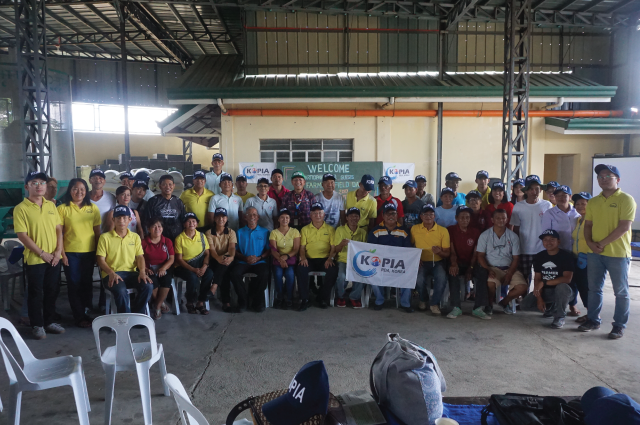 Science City of Muñoz, Nueva Ecija ― Over 70 farmer-members of the Bantug Primary Multi-Purpose Cooperative (PMPC) learned about the best practices in climate change adaptation and nutrient management in rice production in a farmers’ field day, May 5.
Science City of Muñoz, Nueva Ecija ― Over 70 farmer-members of the Bantug Primary Multi-Purpose Cooperative (PMPC) learned about the best practices in climate change adaptation and nutrient management in rice production in a farmers’ field day, May 5.
Organized by Korea Program on International Agriculture (KOPIA) Center Philippines and PhilRice, the activity aims to help farmers manage climate change-related risks and maximize their yield through the use of different technologies.
Dr. Jasper G. Tallada of PhilRice’s Climate Change (CC) Program said that climate change largely impacts rice production.
“Direct effects of CC are increased CO2 and temperature while indirect effects may include increased water variability, drought, floods, heat stress, soil salinity, and invasive pests and diseases, among others,” he said.
Bantug PMPC farmers were then urged to adopt climate-smart technologies and practices. These include diversified farming, cultivation of varieties adapted to various ecosystems and stresses, controlled irrigation, and the use of machines that consume renewable energy.
Tallada also suggested to avail of crop insurance and maximize the use of information portals such as the Pinoy Rice Knowledge Bank and the PhilRice Text Center to stay updated on the latest technologies in rice production.
Meanwhile, Wilfredo Collado, a nutrient management expert from PhilRice, recommended to use organic fertilizer to improve soil condition.
“Consult with your local agriculturists to help you determine the soil types of your rice field. Rice prefers moderately acidic soil,” Collado added.
The farmers’ field day is part of KOPIA and Bantug PMPC’s partnership since 2014. KOPIA provides technical assistance and trains some of the coop’s members in Korea on Rural Transformation Movement, an initiative of South Korea for poverty alleviation.
“KOPIA wants to help the Philippines achieve rice self-sufficiency and help farmers increase their income. Thus, we share yield-enhancing and cost-reducing technologies so that you can be more competitive,” Dr. Lee Jeong Taek, KOPIA Center Philippines director, addressed the farmers.
For the dry season, 15 coop members planted 50.5 ha to NSIC Rc222, a high-yielding variety. Mr. Arthur Orejana, Bantug PMPC manager, reported that the total harvest was 2,874 bags of palay. He expressed his hope that this will also translate to higher income for the farmers.
To date, KOPIA Center has provided the coop 2,124 bags of high-quality seeds amounting to P1,279,050 since the partnership started.
During the program, Dr. Norvie Manigbas, PhilRice scientist and KOPIA project leader, commended the coop and encouraged the farmers to “intensify their efforts in working together.”
“The coop is there to help members purchase their produce, provide loans, lend machineries and provide other helpful services,” Manigbas concluded.




